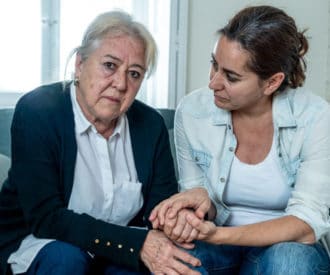Many older adults have multiple chronic health conditions. Treatments for one issue can easily affect other aspects of their health and worsen their overall quality of life. Geriatric doctors specialize in the complex needs of seniors. Let's explore these unsung heroes in medicine below!

Seniors With Complex Health Needs Can Benefit From a Specialist
Managing complex health situations daily in aging adults is precisely what geriatricians (geriatric doctors) are trained to do.
We explain what a geriatric doctor is, how they’re different from “regular” doctors, what they do, and how they benefit seniors, if your older adult should consider switching doctors, and where to find a local geriatrician.
What is a Geriatric Doctor?
A geriatrician is a doctor who specializes in caring for people 65 and older.
They’re internal or family medicine doctors who have an extra 1 or 2 years of training in elder care.
The additional training gives them more experience with conditions like heart disease, arthritis, osteoporosis, mobility issues, or Alzheimer’s disease and dementia.
Geriatricians can be primary care doctors, provide consultations, or work as part of an older adult’s medical team.
Video: What Does a Geriatrician Do?
What’s the Difference Between a Geriatrician and a Regular Doctor?
Geriatric doctors have more experience with common conditions in seniors and with people who have multiple chronic conditions.
They also better understand how older bodies respond to different treatments.
Internal or family medicine doctors are likelier to see patients between 30 and 60 years old. When treating an older adult, these doctors may have to make educated guesses based on their experience with younger patients.
Their lack of experience with aging bodies could also lead them to recommend more aggressive treatments that might not work as well for older patients.
It’s similar to how pediatricians specialize in caring for children.
In a lifetime, someone could start with a pediatrician, change to an internal medicine doctor, and switch to a geriatrician.
What does a Geriatric Doctor Do and How Can Seniors Benefit?
Pay more attention to the quality of life and patient goals
Geriatric doctors focus on quality of life and what patients want from their medical care.
They spend more time at each appointment and collect more information than an internal medicine doctor would.
They ask about lifestyle, community, and family, and get the older adult’s medical history.
Geriatricians also focus on helping seniors and families:
- Figure out their priorities for healthcare
- Create care plans
- Review and manage all medications
- Coordinate care with other health providers
- Provide palliative and end-of-life care
In addition, knowing about differences between older bodies vs. middle-aged bodies helps geriatricians choose treatments that work better for seniors.
Understanding Issues That Commonly Affect Seniors
Most primary care doctors don’t spend enough time finding out about and solving issues that affect older adults.
Falls, incontinence, muscle weakness, frailty, fatigue, cognitive impairment, and delirium significantly impact quality of life.
Geriatricians are experts at these “geriatric syndromes.”
In a Kaiser Health News article, Dr. John Morley, professor of geriatrics at Saint Louis University, says:
“If you’re losing weight, you’re falling, you can’t climb a flight of stairs, you’re tired all the time, you’re unhappy, and you’re on 10 or more medications, go see a geriatrician…Much of what we do is get rid of treatments prescribed by other physicians that aren’t working…”
Should My Parent or Spouse See a Geriatrician?
If your older adult’s current doctor has plenty of experience with their health conditions and you’re happy with the care they provide, there’s no need to make a change.
Seniors could benefit from seeing a geriatrician if they have complex health issues like Alzheimer’s or dementia or feel that their current doctor isn’t paying enough attention to their health issues, overprescribes medication, or doesn’t take a holistic view when making treatment recommendations.
Geriatricians can investigate to determine whether a problem is caused by a non-age-related illness or injury rather than just assuming it’s due to age.
Because they’re more thorough and have more experience with older bodies, you can be more confident that their diagnosis is accurate.

Finding a Local Geriatric Doctor
To find a geriatrician in your area, use the American Geriatrics Society’s geriatrician finder on its Health in Aging website.
Geriatrics is one of the rarest medical specialties, so a geriatrician might not be in your area.
The next best thing is to find a doctor with experience caring for older adults.
Ask for more information to ensure that the doctor you’re considering truly has the experience your older adult needs.
For example, you could ask:
- Have they received additional training in geriatrics?
- How do they approach caring for seniors differently than for middle-aged patients?
- Are there medications they avoid using with older adults?
At an appointment, the new doctor should want to review all of your older adult’s medications, ask about their health conditions, and ask about their goals for care.
Based on their answers and what you observe at the appointment, you’ll know whether they care for seniors seriously or view them like middle-aged patients.
Next Step Find a geriatric doctor near you
Recommended for you:
- 7 Tips for Helping Seniors at the Doctor’s: Being a Health Advocate
- Avoid Conflict When Helping Seniors at Doctor’s Appointments
- 5 Questions to Ask Doctors About Tests and Treatments for Seniors
This article wasn’t sponsored and doesn’t contain affiliate links. For more information, see How We Make Money.
About the Author

Connie Chow
Connie was a hands-on caregiver for her grandmother for 20 years. (Grandma made it to 101 years old!) She knows how challenging, overwhelming, and all-consuming caring for an older adult can be. She also knows how important support is — especially in the form of practical solutions, valuable resources, and self-care tips.





I am currently searching for a geriatric physician. I live in Amherst, N.Y.
The closest I found in your searches are over 100 miles.
My current Dr. is not responsive to what is going on with me. So I feel it’s time to find one that specializes in older adults . I was taking hormones, but had to stop I gained 75lbs in three months; and I am retaining water around my ankles. … at wits end at this point.
We’re so sorry to hear about your current situation and that your doctor isn’t being helpful or responsive. It sounds like a good idea to find another doctor.
Unfortunately, geriatric medicine is one of the medical specialties with too few doctors, so there may not be one in your local area. The next best thing to do would be to call different doctors in your area to find someone who has more experience treating older adults.
I would love to find a Geriatric doctor within reasonable distance of my home. There is one which is about 25 miles from home – too far for me.
When I used the search tool in the article for AZ and Tucson – a Pharmacist came up! A pharmacist at the U of A!
So, eliminated the city – 5 in Phoenix – a 2 hour drive.
The one who is located in the Rita Ranch area well east of Tucson! Our current PCP no longer will communicate with me via patient portal and I have to do my own referrals for specialists. Not acceptable but, in one’s 80’s = most simply don’t care.
Unfortunately, geriatric medicine is one of the medical specialties with too few doctors, so there may not be one in your local area. The next best thing to do would be to find a doctor who has more experience treating older adults.
According to the American Geriatrics Society, in 2018, there were 7,298 certified geriatricians in the U.S. and 107 in the state of Arizona. Hopefully those numbers have improved since then, but there still aren’t enough geriatricians for the number of older adults who need one.
Source: https://bit.ly/3xeqtPj
This article is a Godsend! I’m caring for my 80 yr. old grandmother whose physical (not so much medical) condition started deteriorating over a 4-5 month period. Appts back & forth to her PCP (gen. internal medicine), MRI’s, scans, blood work, but no improvement, just increased medical co-pays/ bills…I tried asking him about experience with geriatric psychosomatic symptoms without being ‘that pushy family member’, but more and more, I kept feeling, “We’re not getting anywhere, what should I be doing different?!”
This article gives me conformation that I should be doing something different and that what could be part of my grandmother’s health issue is real and probably treatable/manageable with the right professional. I wish there was a return policy on unnecessary visits/ procedures (LOL). Knowledge is Power-THANK YOU!!!
So glad to hear that this article is helpful! You’ve done a wonderful job advocating for your grandmother and trying to get better care from her current doctor. It’s great that you’re now seeking someone with more experience with older adults who could give her the care she needs. I hope you find an excellent doctor ❤️
Can I get arbitration so I can at least try to make a wrongful death insurance claim even if no lawyer will take the case? Also, How do I get my mother’s medical records if I was not power of attorney? Is showing that I was next of kin on the death certificate enough to get her medical records released to me?
One lawyer wants me to pay 400 dollars an hour, I asked for one hour of pro bono, I have not heard back yet.
Unfortunately, we’re not lawyers so we don’t have answers to any of these questions. You may want to check if your county has a Legal Aid Society that provides pro bono or low-cost legal services. I hope you find a solution that works.
I meant to add that in my prior 20 years of always being there for my parents, the ER, Hospital and Urgent Care were always appreciative of my being there on behalf of my parents.
This time I was treated like I was invisible.
I tried to get my mother a geriatric doctor as a back-up to her primary doctor. My mother’s MediCare provider did not have a Geriatric Doctor. I believe my mother would be alive today if I had access to a Geriatric Doctor for second opinions.
The ER basically ignored my mother’s wheezing and instead called it Emphysema even though my mother and I walked up to 1.1 miles on a regular basis.
When my mother had a low grade cold I knew she would not be treated for it. But when it started to get worse, resulting in wheezing and her words being said in a broken fashion, I called 911 and the most brutal eperience imaginable first dealing with combative, non empathetic first responders, then dealing with an ER that refused to even acknowledge her wheezing.
I would have immediately contacted my mother’s Geriatric Doctor if she had had one. Primary Care physicians can sort of toggle back and forth between using a standard of care that a 50 year old would need and then applying it to a 90 year old patient, and that is just not right.
In my opinion the ER sent my mother home to die three days later when I had actually brought her in at the perfect time, when her cold was just starting to escalate into something worse.
I will forever be devastated when I remember how cooperative my sweet mother was who still took delight in living and I could not protect her from heartless ER personnel who literally called security to force us to leave.
I’m so sorry that happened to you and your mother and I’m very sorry for your loss 💔 It’s terrible that so many medical professionals failed to do a proper job for your mother and take her symptoms and your concerns seriously 🙁
It’s criminal what they did, but good luck to me to find anyone who will take on a corrupt doctor and a few of the doctor’s henchman. I have been in ER’s, Urgent Cares and Hospitals on behalf of my mother and father for the past 20 years, this despicable life snuffing attitude by the doctor, the MediCare healthplan’s sociopathic intake monitor who literally scowled at my mother when he walked by our ER room that day and just kept walking.
I had a run in with that same person four years earlier when he pushed my mother out of the Hospital too early and she was brought back in two days later for a second tussle with her pneumonia.
The guard who forced us out of the ER, and the Nurse who violated tenets of civility and refused to do anything that I asked in a respectful nature.
I’m so sorry you and your mother had such a terrible experience 🙁 If you wanted, you could file a complaint with the medical board in your state. For example, here’s information about filing a complaint in California http://www.mbc.ca.gov/Consumers/Complaints/ Your state will have its own state medical board website. You may also be able to file a complaint with the hospital administration as well.